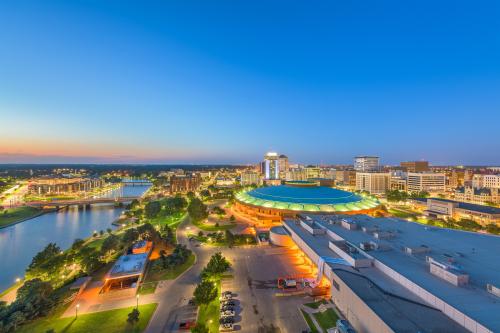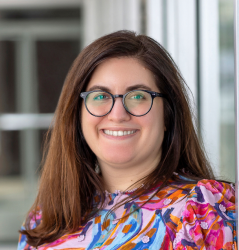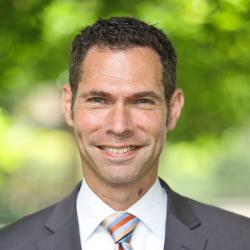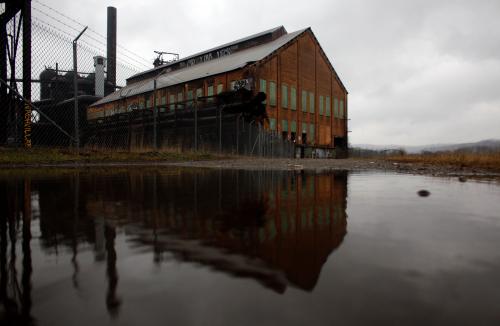In a converted parking garage turned business incubator and accelerator in downtown Syracuse, N.Y., entrepreneurs and inventors from as far away as Italy and Switzerland are hard at work developing software applications, power systems, and imaging technology for the emerging unmanned systems industry.
The presence of these global innovators represents an early win in a regional strategy to establish the central New York region as a global industry hub, leveraging historic local advantages in electronics, sensors, and defense applications to meet the growing global demand for drones, “internet-of-things” platforms, and other data-driven technologies.
To prosper in the global economy, midsized city-regions are increasingly focused on establishing these distinctive, world-beating industry specializations that leverage local strengths. This includes investing in these specializations, as well as the industrial commons and programming that supports them. It also means strategically orienting export assistance, foreign direct-investment promotion, customer discovery, talent attraction, innovation partnerships, and other global connections to specifically target these local sectors.
In Syracuse, the regional economic development organization, CenterState CEO, is successfully executing on this strategy with local and state partners. Focused on unmanned systems and related data-to-decision platforms, the GENIUS NY competition has brought 17 startups—a quarter of them, like the firms from Italy and Switzerland, from outside the U.S.—to the Tech Garden since 2017 for a yearlong in-residence program of support along with millions of dollars in seed funding prizes. They also repositioned limited resources from broad-based FDI attraction to prioritize unmanned systems, engaging nine foreign companies over five years. A new sector alliance of public, private, and academic stakeholders launched an annual global symposium that attracts hundreds of attendees who, before, might not have been able to identify Syracuse on a map. And during a recent trip to Israel, New York Governor Andrew Cuomo announced the creation of a UAS Center of Excellence to, in part, facilitate the transfer and deployment of commercial Israeli UAS technologies into the U.S.
“The innovation ecosystem we have created at the Tech Garden, particularly around the UAS industry, has enabled us to attract high-growth companies from across the globe,” said Rick Clonan, vice president of innovation and entrepreneurship at CenterState CEO. “This has brought a new level of expertise and global connections to our programs, which, in turn, provides greater access to new markets, customers, and further opportunity to grow the unmanned systems industry in our region.”
Similarly, St. Louis is concentrating on global engagement to strengthen and extend its regional specializations. Leaders have proactively sought out global innovators and startups to fill gaps and expand the local ecosystem around their plant technology and bioscience sectors. Leaders at the local agriculture-technology-focused innovation district 39 North, the Danforth Plant Science Center, Washington University in St. Louis, cluster organization BioSTL, and other partners also collaborated to strategically showcase regional opportunities to global industry leaders at an annual ag-tech conference. Relationships built there led to a two-week accelerator program hosting European and Central American ag-tech startups in a local incubator and connecting them to the St. Louis ecosystem.
“The issue of agriculture and food security is a global issue, so it makes sense then to solve it with people from all over the world,” said Janet Wilding, vice president of 39 North and major projects at the St. Louis Economic Development Partnership. “You’re just going to have better thinking if you have an international group of people in the room. The more you’re talking to peers all over the globe, you’re seeing the whole elephant, not just the tail.”
Des Moines, Iowa has tested and extended these international sectoral strategies in areas such as insurance and agriculture. Building off a successful global accelerator and annual symposium focused on its insurance-tech concentration, Des Moines launched a 90-day AgriTech Accelerator to draw industry startups and expand its local ecosystem. Although global companies were not explicitly the principal audience, over 50% of applications to the program this year came from Brazil, Israel, and several European and African nations.
“It’s helping our sector tap technology, expertise, and different perspectives around the world,” said Kerty Levy, the accelerator’s interim director. “Some of our investor companies have major operations in Brazil, and there’s nice synergy there. They’re able to talk about rural Brazil and water issues and then bridge that to what that looks like here.”
As leaders are finding in Syracuse, St. Louis, and Des Moines—as well as other regions like Upstate, S.C. and Minneapolis-St. Paul—global engagement can help elevate the scope, capabilities, and ambition of regional industries and innovation. Connecting entrepreneurs and workers to market leaders and big global problems strengthens sectors, and even raises everyday activities into a larger vision.
“The goal is, yes, that we’re attracting businesses and growing business,” said St. Louis’s Janet Wilding. “We have to get out of our comfort zone and know our global partners. We must collaborate globally in order to feed everybody. To me, that’s the success story.”
The Brookings Institution is committed to quality, independence, and impact.
We are supported by a diverse array of funders. In line with our values and policies, each Brookings publication represents the sole views of its author(s).










Commentary
To succeed in the global economy, cities must invest in what makes them unique
August 23, 2019